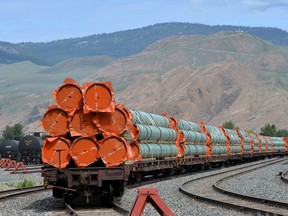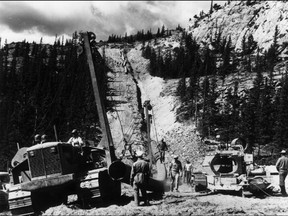Opinion: Alberta to B.C. Pipeline expansion is favorable to Canada and federal government should declare it in law

Canadian national interest.
Doing so will prove to the Canadian public and Indigenous communities that the federal government is serious about its completion.
Don't get me wrong. Canceling the project would be devastating for many indigenous communities along the corridor.
This issue becomes even more pressing in light ofCongressional Budget Officers' recent report on the project. PBO has determined the net present value of the pipeline to be negative $600 million, leaving him in December 2020 worth about $1.2 billion less than PBO's estimate. Additional costs have pushed the completion date of the project to the third quarter of 2023.
The PBO also found that canceling the project would cost the federal government huge losses, forcing it to write off $14.4 billion in assets.
} Ottawa says it has no plans to cancel multi-billion dollar projects, but hiding behind these cost overruns, it may be easy to call the whole thing off. Given the bias, it's not unimaginable.
We also know that some environmental activists are targeting investors and insurance companies with targeted campaigns to eradicate Trans Mountain. It is important that the government formally defends the pipeline.
The 1,150 km long Trans Mountain Pipeline carries about 300,000 barrels of oil per day and is the only export pipeline from Alberta to the coast of British Columbia. With this expansion, production capacity will increase to approximately 890,000 barrels per day.

The Russian invasion of Ukraine shows how dependent many European countries are on Russian oil and gas imports. increase. Ottawa's prof pledge to support NATO allies has finally turned the government's attention to the importance of global energy security.
But even before the global energy crisis escalates, the federal government must declare through legislation that the expansion of the Trans Mountains is in the general interest of Canada. did.
The facts speak for themselves. To date, Trans Mountain says he has signed 69 agreements with indigenous groups inBritish Columbia. and Alberta represent over $600 million in benefits and opportunities.
This includes training programs for community members, financial compensation, environmental initiatives, and construction projects such as projects to develop yards that can later be used to establish housing, schools, soccer fields, or facilities. Includes legacy projects that followed. Businesses such as roadside restaurants and gas stations.
The company says more than 2,500 indigenous workers have worked on the project so far, representing 11% of the total workforce.
A vast network of indigenous owned and joint ventures participates. So far, more than 4,700 contracts have awarded more than $3.2 billion to Indigenous businesses.
-

Trans Mountain secures $10 billion to cover construction costs
-

Trans Mountain expansion overruns budget, months ahead of schedule The delayed
Trance Mountain expansions areNesika Services,Project Reconciliation,Chinook Pathways It has attracted the interest of several indigenous groups such as. Equity ownership of the project.
These partnerships represent the maturity of indigenous capital. Dumping Trans Mountain strategically would disappoint these indigenous groups and undermine the confidence of indigenous communities in their ability to work with the federal government on resource projects.
The federal government It's fixated on undermining the energy sector at every turn, and its flawed "just transition" plan makes it more likely to abandon projects if the conditions are right.
In June, a spokesperson for Deputy Prime Minister Chrystia Freeland said the project was still in the national interest. Congressman Douglas Black introduced a bill to formally declare Trans Mountain in the national interest. This protects your project from interruptions and ensures its completion. However, the Trudeau administration allowed the bill to be repealed in the House of Representatives.
Ottawa must enact similar legislation to ensure that more Trans Mountain extensions are built for energy security and the prosperity of Indigenous peoples. Hmm.
Joseph Quesnel is a Nova Scotia-based consultant for the Canadian Energy Center and by his heritage Quebec his Metis.
Courtesy of Troy Media.
Letter to the Editor is sunletters@vancouversun.com Editorial page editor is Hardip Johal. The contact is hjohal@postmedia.com.
More news, less ads, faster load times: Unlimited ads to Vancouver Get Lite Access Sun, the Province, National Post and 13 other Canadian news sites for just $14/month or $140/year. Subscribe now and receive daily at Vancouver Sun or The Province

Headline news from Vancouver Sun, a division of Postmedia Network Inc.
Thank you for registering.
Sending welcome email. If you can't find it, please check your spam folder.
The next issue of Vancouver Sun Headline News will arrive in your inbox shortly.


